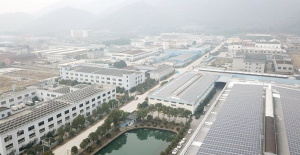BRUSELAS, 8 Sep. (EUROPA PRESS) -
Spain must increase environmental taxes and reduce subsidies that are harmful to the natural environment, as pointed out by the European Commission in its review of the application of environmental regulations.
This report helps Member States tackle systemic obstacles to integrating environment-related issues into their national policies. In the case of Spain, Brussels points out as a pending challenge "to transfer taxation from work to the environment and reduce subsidies that are harmful to the environment."
"Spain is one of the Member States with the lowest environmental taxes in the EU in relation to its national gross domestic product," the report pointed out.
Also, the community review emphasizes the need to improve water management, "in particular the complete treatment of urban wastewater." Brussels calls for an improvement from the water governance itself, the rehabilitation of water bodies and their water efficiency. "More investments in infrastructure are necessary. Spain is paying fines for its non-compliance with the Directive on urban wastewater treatment," he recalled.
The report also asks Spain to "take a step forward" to improve municipal waste management and further develop the circular economy. After confirming that Spain did not meet the EU objectives for 2020 to recycle 50% of municipal waste, the European Executive assures that it will take a "significant effort" to reach the current goal of recycling 55% of urban waste by 2025.
Of course, Brussels puts the positive note in the adoption in July 2021 of the national plan for purification, sanitation, efficiency, saving and reuse of water, and the approval of a Circular Economy Strategy at the national level in June 2020.
It also considers important progress that large metropolitan areas have approved the creation of low emission zones by 2023 to deal with air quality and welcomes the State Strategy for green infrastructure and ecological connectivity and restoration.

 Exploring Cardano: Inner Workings and Advantages of this Cryptocurrency
Exploring Cardano: Inner Workings and Advantages of this Cryptocurrency Seville.- Economy.- Innova.- STSA inaugurates its new painting and sealing hangar in San Pablo, for 18 million
Seville.- Economy.- Innova.- STSA inaugurates its new painting and sealing hangar in San Pablo, for 18 million Innova.- More than 300 volunteers join the Andalucía Compromiso Digital network in one month to facilitate access to ICT
Innova.- More than 300 volunteers join the Andalucía Compromiso Digital network in one month to facilitate access to ICT Innova.-AMP.- Ayesa acquires 51% of Sadiel, which will create new technological engineering products and expand markets
Innova.-AMP.- Ayesa acquires 51% of Sadiel, which will create new technological engineering products and expand markets The Amnesty Law faces its last process in the Cortes for its entry into force and for it to be applied by the courts
The Amnesty Law faces its last process in the Cortes for its entry into force and for it to be applied by the courts United Nations estimates at least 670 dead after Friday's landslide in Papua New Guinea
United Nations estimates at least 670 dead after Friday's landslide in Papua New Guinea Albares defends the recognition of Palestine as an instrument to achieve an "irreversible" peace with Israel
Albares defends the recognition of Palestine as an instrument to achieve an "irreversible" peace with Israel The PSOE calls the PP concentration a "prick": "It does not even reach half of its last call"
The PSOE calls the PP concentration a "prick": "It does not even reach half of its last call" How Blockchain in being used to shape the future
How Blockchain in being used to shape the future Not just BTC and ETH: Here Are Some More Interesting Coins Worth Focusing on
Not just BTC and ETH: Here Are Some More Interesting Coins Worth Focusing on UPV research helps prevent batteries in electric scooters and bicycles from catching fire
UPV research helps prevent batteries in electric scooters and bicycles from catching fire A UA research team develops a web application to estimate the potential risk of gas
A UA research team develops a web application to estimate the potential risk of gas Merino is committed to attracting AI companies to consolidate an "innovative and competitive" economic model
Merino is committed to attracting AI companies to consolidate an "innovative and competitive" economic model They develop an intelligent "nanokiller" against bacteria and other pathogens
They develop an intelligent "nanokiller" against bacteria and other pathogens A million people demonstrate in France against Macron's pension reform
A million people demonstrate in France against Macron's pension reform Russia launches several missiles against "critical infrastructure" in the city of Zaporizhia
Russia launches several missiles against "critical infrastructure" in the city of Zaporizhia A "procession" remembers the dead of the Calabria shipwreck as bodies continue to wash up on the shore
A "procession" remembers the dead of the Calabria shipwreck as bodies continue to wash up on the shore Prison sentences handed down for three prominent Hong Kong pro-democracy activists
Prison sentences handed down for three prominent Hong Kong pro-democracy activists ETH continues to leave trading platforms, Ethereum balance on exchanges lowest in 3 years
ETH continues to leave trading platforms, Ethereum balance on exchanges lowest in 3 years Investors invest $450 million in Consensys, Ethereum incubator now valued at $7 billion
Investors invest $450 million in Consensys, Ethereum incubator now valued at $7 billion Alchemy Integrates Ethereum L2 Product Starknet to Enhance Web3 Scalability at a Price 100x Lower Than L1 Fees
Alchemy Integrates Ethereum L2 Product Starknet to Enhance Web3 Scalability at a Price 100x Lower Than L1 Fees Mining Report: Bitcoin's Electricity Consumption Declines by 25% in Q1 2022
Mining Report: Bitcoin's Electricity Consumption Declines by 25% in Q1 2022 Oil-to-Bitcoin Mining Firm Crusoe Energy Systems Raised $505 Million
Oil-to-Bitcoin Mining Firm Crusoe Energy Systems Raised $505 Million Microbt reveals the latest Bitcoin mining rigs -- Machines produce up to 126 TH/s with custom 5nm chip design
Microbt reveals the latest Bitcoin mining rigs -- Machines produce up to 126 TH/s with custom 5nm chip design Bitcoin's Mining Difficulty Hits a Lifetime High, With More Than 90% of BTC Supply Issued
Bitcoin's Mining Difficulty Hits a Lifetime High, With More Than 90% of BTC Supply Issued The Biggest Movers are Near, EOS, and RUNE during Friday's Selloff
The Biggest Movers are Near, EOS, and RUNE during Friday's Selloff Global Markets Spooked by a Hawkish Fed and Covid, Stocks and Crypto Gain After Musk Buys Twitter
Global Markets Spooked by a Hawkish Fed and Covid, Stocks and Crypto Gain After Musk Buys Twitter Bitso to offset carbon emissions from the Trading Platform's ERC20, ETH, and BTC Transactions
Bitso to offset carbon emissions from the Trading Platform's ERC20, ETH, and BTC Transactions Draftkings Announces 2022 College Hoops NFT Selection for March Madness
Draftkings Announces 2022 College Hoops NFT Selection for March Madness


























